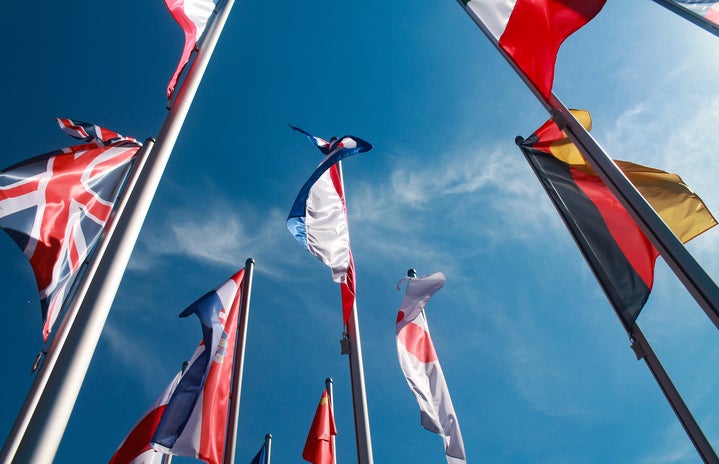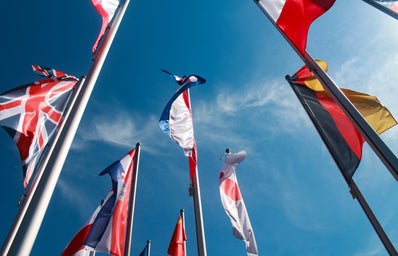For decades we have condemned Europe’s brutal colonization of the African continent and much of South-East Asia. The world has abolished the apartheid regime and put forth an imposing global effort toward fighting inequality, poverty, and promoting human rights in the Global South.
However, even though almost every child attends school today and millions of people have been lifted out of poverty, the international community seems unable, or simply unwilling, to eradicate the gap between the North and the South.
Today, 356 million children grow up in extreme poverty, 62.8% do not attend school, and around 5 million children die every year from diseases that could easily have been prevented.
What would you call this system of inequality?
It certainly echoes what history previously has shown us. We have, and continue to, perpetuate the underdevelopment of the African continent; it is simply a modern form of colonization.
The most visible contribution to this unequal system between the developed and developing countries is the practice of giving aid. Never in history have the western countries given this much aid to the South. However, the results remain unimpressive. Aid has in fact contributed to sustaining the unbalanced power relation that existed during colonization, and one might argue that Africa was better off without it.
Today’s aid is dead for four reasons:
1. NO DEFINITION OF GOOD DEVELOPMENT
To begin with, we do not have a common consensus on what good development should contain. Not even social scientists, nor international NGOs, can agree on what is right or wrong. If we do not have a common goal, the international community will never be able to eradicate these global issues.
However, many important questions remain unanswered. Should we aspire to force a western democracy upon these countries? Can western human rights be translated? Who are we to say what’s right? Norway, for instance, has one of the highest suicide rates in the world. Can we call this good development, or is it time to acknowledge that our way of doing things is not always the best?
2. FAILURE TO PROMOTE DEMOCRACY
If we base our proposal on the assumption that the main goal of providing aid is promoting democracy, we are by all means moving in the wrong direction. Aid creates aid dependency, and dependency does not create an independent, sustainable democracy. One issue at hand is that these countries will be extremely vulnerable to fluctuations in the world economy. Another is the different NGOs’ demands to the country receiving the aid.
For instance, Tanzania receives aid from around 350 different actors. Let’s say that the government of Tanzania has to attend one meeting with every single of these actors a year. That’s a lot of time the government uses to prove to NGOs that the aid aim is met—time that the government could use to provide their citizens with the services a state is obligated to provide.
Furthermore, allowing different NGOs to take on some of the state’s responsibilities, such as education and health, is actually destroying the democracy of the respective country. If you receive your schooling from Plan International, your water from UNICEF, and the shelter you need from the Red Cross, why would you bother voting in your local election?
Why would you care if the government is corrupt, if you get all your services from NGOs?
The population will indeed be left in a “democracy” where the real election shouldn’t be concerning the government, but the NGOs—considering they are the ones actually providing the citizens with the services they need.
3. EUROCENTRISM
Today’s aid is heavily influenced by eurocentrism. It relies on white men with million-dollar salaries, sitting in an office in a Western country, deciding what’s best for these countries—usually based on a western model, which can be referred to as institutionalized, eurocentric aid. In other words, the faith of people living in aid-receiving countries relies on decisions made by people who don’t know anything about what it’s like to live there.
If we do not work alongside these developing countries to provide them with the help they need, we are in fact doing exactly what we did during the colonization of Africa: looking at them as irrational human beings who are incapable of developing their own country and imposing our way of living on them.
4. A PARADOXICAL AIM
Finally, the aid has a paradoxical aim. The biggest receiver of aid has for years been countries of war or undergoing a crisis. We sent over millions of dollars to these counties in aid while putting the double amount in weapons and military to go to war against them. The word aid is translated to help, but I think we all can agree that this is certainly not helping—it is destroying.
WHAT SHOULD WE REPLACE IT WITH?
What then, should traditional aid be replaced by? Some argue that putting an end date to all international aid is the solution. I strongly disagree with this, even though it does contain some neo-liberal solutions that are fitted to the capitalistic world we live in. Whether or not you agree with this system is irrelevant. Instead, we must recognize that if today’s system and success in development rely on the market economy, the developing countries need to be included in this economy.
We simply need to drastically change the WTO and the way we do trade.
This neo-liberal perspective brings me to my final solution: free money. The concept of free money, or money transfers without conditions tied to it, is hardly a new concept, but it is a forgotten one. It is forgotten in the space between left wings being unwilling to give the individual enough freedom to make their own money and right wings opposing the use of money on “welfare systems.”
But why should we give humanitarian workers from the west million-dollar paychecks to assure that Somalian children have food on their table when we could distribute this money directly to the families affected?
THE POOR KNOWS WHAT THE POOR NEEDS
The concept of free money is not far from the concept of Microcredit/Micro-loans, which has helped to lift much of Bangladesh out of poverty. Its goals are direct: promoting empowerment and fighting poverty. These are two things traditional aid has failed to do.
I disagree with the fact that the money should be a loan. However, the concept remains the same: you give the poor money. The results are remarkable, and this is for two reasons.
First, people are poor because they have no money. Shouldn’t it then be obvious that giving them money would drastically improve their situation? And second, the poor know what the poor need.
They do not need people from other countries and cultures to educate them. To say this would be to take away all rationality this individual has. It has been proven that when families receive these kinds of money transfers, they use it to start their own business, send their children to school, buy health insurance or save up for future investments.
Not to mention that their buying power will increase, stimulating the countries’ economy and leaving the state with more resources to provide basic services for its citizens.
THE END OF TRADITIONAL AID?
We cannot continue to push traditional aid in an ever-changing neo-liberal market economy. We need to include them in our trade market, stop forcing them to depend on our contributions, and start seeing these individuals as rational human beings that can take control of their own destinies.
Call it the dark side of capitalism if you will, but if you are willing to leave the world economy in the hands of a neo-liberal market, then you should also practice aid neo-liberally. We need to recognize that we do not have the solution to poverty—they do. Only then can we create a world that moves away from its roots in colonization.


